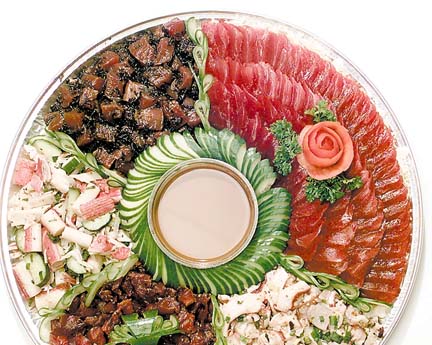



You can’t buy
sashimi early; but
you CAN order
Finding fish for New Year
By Betty Shimabukuro
sashimi is always a scramble;
this year, even more so
Star-BulletinAt least with champagne, you can buy now and save it for your millennium celebration.
But if your New Year's event must include sashimi, thinking about it now isn't going to help much.
In fact, ask fish suppliers what to expect come that last week of the 1900s and they'll laugh in your face.
Unless you can predict the whims of nature, the most anyone can do is hope for the best, said Brooks Takenaka, assistant general manager of United Fishing Agency fish auction at Kewalo Basin.
Availability of the highly sought-after ahi is dependent on too many factors out of the control of mere mortals. "Weather, basic atmospheric conditions, how currents are running, temperatures, all that sort of stuff," Takenaka said.
The only thing predictable is demand, he said. "I would expect that there's going to be an incredible demand. People are probably going to be quite interested in obtaining sashimi."
And no matter how badly retailers want to meet that demand, they can't stock up, due to the highly perishable nature of fresh fish, Takenaka said. "You've got a fairly limited reality as far as shelf life of your product."
Ahi sashimi - the highest grade possible - is a New Year's tradition in Hawaii, especially among Japanese families. "It's a good way to end and start the year," said Guy Tamashiro, president of Tamashiro Market.
Add to that the fact that ahi quality is usually at its best at that time of year. "The water is colder and fish is fattier, it's a better grade in terms of fat content, which is desirable for those who eat sashimi or poke," Tamashiro said.
His advice: Order early. Call at the beginning of December.
Another suggestion is to consider other types of fish - nairagi, for example, or kajiki - white-fleshed fish that are usually in good supply in late December and make fine sashimi.
But, Tamashiro said, that just won't cut it for many people.
"During the holidays it's a tradition and a custom to have red-flesh fish for Christmas and the new year and we want to provide what the customers want. Although there are many excellent alternatives for those willing to experiment, ahi is the staple for that time of year; it's the product that's in highest demand."
Tamashiro said his store always has ahi during the holidays; how quickly it moves is just a matter of how much buyers are willing to pay. Last December's ahi catch was strong, and prices stabilized at $10 to $20 a pound.
The early part of 1999, though, wasn't good for tuna, said Glenn Tanoue, president of Tropic Fish and Vegetable, a major fish wholesaler. "Hopefully we'll see a return to a normal season."